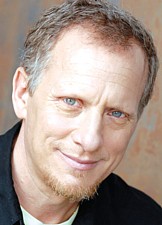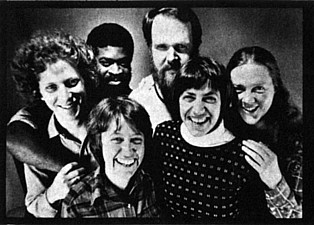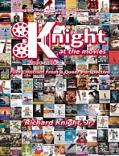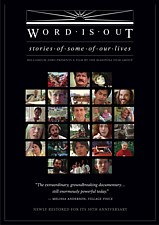
Epstein in 2010 publicity shot for Howl and with the Mariposa Group, the six primary creators of
Word Is Out. Epstein is in the back row at left near a bearded Peter Adair, the film's driving force.
Word Is Out. Epstein is in the back row at left near a bearded Peter Adair, the film's driving force.
film from a queer perspective
Interview
| KATM media outlets |
| KATM featured weekly |
| Join Us! |
| KATM on RT |
| Vidcast Starring KATM |
| NOTE: THIS SITE ONLY LOADS CORRECTLY WITH EXPLORER AND MOZILLA BROWSERS - SORRY SAFARI USERS! |
| Buy the KATM Book |
The "Word" On Rob Epstein
Expanded Edition of 6-8-10 Windy City Times Interview
By Richard Knight, Jr.
Expanded Edition of 6-8-10 Windy City Times Interview
By Richard Knight, Jr.
| WINDY CITY TIMES (WCT): The making of Word Is Out has such a serendipitous quality to it – this accidental collective that somehow made this groundbreaking movie. When I read your essay about the filming that you wrote back in the late 70s it reminded me of how popular encounter groups were at the time – life inside a bubble so to speak. Can you talk about the experience? ROB EPSTEIN (RE): None of us had any perspective on it while we were going through it which is probably why it was successful. Nancy Adair (Peter’s sister) was really the only one who had any experience in structuring a communication process so she really helped set up this kind of fail safe communication system that we relied on called “pass the rattle.” Whenever we got into any kind of conflict situation we could depend on this system where we would go around in a circle and we each would have an opportunity to talk uninterruptedly and then we’d go around and get each response. It just built in a process that you knew you would always have an opportunity to be heard. Because that was the stop gap measure we always felt that kind of trust with each other and the rest was pretty organic – it was that group of people at that particular time and that particular project and I don’t think it could ever be recreated in any other way. It was serendipitous. WCT: In looking back, it was exceptional for the time. RE: Yes, it was pretty exceptional for the time when there wasn’t really any kind of precedent for gay men and women to work together in that way and the fact that there was such age disparity between us was pretty remarkable. But everybody respected the value of that – that we did each bring something so different to the table. WCT: Peter Adair’s vision had to also have been so inspiring. What was he like to be around? RE: His vision, his spirit and personality were key to the whole mix and success of it. Peter was first a great friend and he was a great teacher in that he was a great enabler. He basically handed me a camera at 19 and said, “Here’s how you use it, go off and find some stories” and he did that with every aspect of the production so Peter was my film school. He really trained me as a filmmaker and a producer. And he was just a lot of fun – he had a great sense of humor, very perverse and there were a lot of laughs and tears, too. As a man he had great access to his emotions which was something that I wasn’t at first very comfortable with but I learned a lot from him. He was a real role model for me as a gay man in a lot of ways and that was certainly one. WCT: When you answered the ad – that fateful ad – had you planned on getting into filmmaking? RE: No. I had just started thinking about it. I was in college on the east coast and I had taken a leave of absence basically to come out because at that point in the time I thought that was what I had to do. So I got on a bus from New York to San Francisco and started a new life for myself at 19. I started taking some introductory film classes and doing my own Super 8 projects at the same time as I answered that ad so it kind of happened simultaneously. WCT: When you watch the film now over 30 years later what stands out about it for you? RE: It’s got a lot of heart. I think there’s something so authentic about the film that feels eternal. It’s interesting, because the things that are dated are somewhat minor – the music in the film, the feminist folk singer, the gay male troupe – but I find it completely charming and so of the period and the superficial stuff like the hairstyles and clothing. But otherwise, the people are speaking their own truths, which is everlasting and primal. WCT: The film does seem to represent so many aspects of gay culture then and now and it really resonates. I’m just curious if you think a new generation caught up in “Glee” and Lady Gaga will watch the movie. How do you get their attention? RE: The smart ones will discover it if they haven’t already. I think it’s all important for us to know what preceded us and to understand who opened what doors and this is really the first generation of people that were coming out publicly. The people in the film by being in it were very brave because that hadn’t really been done before in that public a way. It’s because of that that everything else started to change in the culture. We started to represent it ourselves and that’s one of the moments when it started to happen. I think younger people will learn a lot and the film is also very entertaining. WCT: If you could recreate the experience of the directing collective – are there certain filmmakers you would call on? RE: It’s interesting because I work in a collaborative directorial relationship now. I work with a producing-directing partner so I suppose I take a little bit of that in my collaboration with Jeffrey Friedman, my filmmaking partner. But I think it would have to be younger people doing something of this particular moment and it would look very different from what that moment was. I don’t think I could describe that or even define that. WCT: I understand that The Times of Harvey Milk is also being restored. RE: It is. Criterion is releasing the film at the beginning of 2011. We’re just deciding what additional material we’ll be adding to the extras on the Criterion release. We’ve already done the HD master and it looks amazing. WCT: I’m so psyched for that one as well. Did you participate in the recent Harvey Milk Day? RE: I was traveling and was out of the state so I didn’t. I was in Canada with Howl. WCT: Is it conceivable to you that one day we’ll have a national holiday to honor Harvey? RE: Boy! Yeah, I suppose that’s conceivable. We just thought about a state holiday but why not. I always thought if he were alive it would have been Obama-Milk so perhaps this will be at the head of the ticket. WCT: We just lost Peter Orlovsky, Allen Ginsberg’s lover. Can you talk a little bit about directing James Franco in Howl, the biopic of Ginsberg which is headed to Chicago this fall? RE: Directing James was great – it was a really wonderful adventure and collaboration. James came onboard before we actually had producers. He read the screenplay and we offered him the part and we had the luxury of working with him for about a year’s time as the screenplay was evolving and talking about the character of Allen that he’d be playing and the meaning behind a lot of the texts. So by the time we got on set he was totally immersed in the material and prepared for it so the physicalization of the character of Ginsberg was kind of the last layer of it all because he had done all that super foundational work beforehand. He’s brilliant in the film. He’s really proud of it; we’re really proud of it and I think people will be really, really surprised by his performance. WCT: As a film enthusiast, a film critic and as a gay man, your films have been so influential for me and I’m thrilled to have the opportunity to thank you. RE: Thank you! |


Some dream of interviewing Madonna or perhaps George Clooney. But for me director Rob
Epstein, Oscar winner for the seminal LGBT documentaries The Times of Harvey Milk and Common
Threads: Stories from the AIDS Quilt, along with a plethora of others, has been a dream “get.”
Epstein, along with his producing-directing partner Jeffrey Friedman, are also the creative team
responsible for Paragraph 175, Howl, the eagerly anticipated biopic of queer poet Allen Ginsberg (with
James Franco in the title role), and for me, most importantly, The Celluloid Closet, the award winning
historical documentary of gays and lesbians in the first 100 years of cinema. It was the first film I
wrote about for Windy City Times in my Knight at the Movies column in May of 2004 and it remains
the movie that I point to as the starting place for anyone wishing to learn about the complicated
relationship between the LGBT community and the movies.
Epstein, Oscar winner for the seminal LGBT documentaries The Times of Harvey Milk and Common
Threads: Stories from the AIDS Quilt, along with a plethora of others, has been a dream “get.”
Epstein, along with his producing-directing partner Jeffrey Friedman, are also the creative team
responsible for Paragraph 175, Howl, the eagerly anticipated biopic of queer poet Allen Ginsberg (with
James Franco in the title role), and for me, most importantly, The Celluloid Closet, the award winning
historical documentary of gays and lesbians in the first 100 years of cinema. It was the first film I
wrote about for Windy City Times in my Knight at the Movies column in May of 2004 and it remains
the movie that I point to as the starting place for anyone wishing to learn about the complicated
relationship between the LGBT community and the movies.
Imagine my surprise and delight to learn in reading over a press
release for the long awaited DVD release of the beautifully restored
1977’s Word Is Out: Stories of Some of Our Lives, the first
feature length documentary about gays and lesbians made by gays
and lesbian filmmakers, that Epstein was part of the original core
group of six (collectively known as the Mariposa Group) that worked
on the film. A new arrival in San Francisco (he was 19 at the time)
Epstein answered an ad by the late filmmaker Peter Adair looking for
gays and lesbians to work with him on this groundbreaking project.
Epstein’s laudatory career as a chronicler of gay history, via his
wonderful documentaries followed this formative experience. And
over 30 years after seeing the film myself, I’ve finally gotten the
chance to speak about it with one of its creators. That it was with
one of my filmmaking and queer culture heroes was a terrific bonus.
Highlights:
release for the long awaited DVD release of the beautifully restored
1977’s Word Is Out: Stories of Some of Our Lives, the first
feature length documentary about gays and lesbians made by gays
and lesbian filmmakers, that Epstein was part of the original core
group of six (collectively known as the Mariposa Group) that worked
on the film. A new arrival in San Francisco (he was 19 at the time)
Epstein answered an ad by the late filmmaker Peter Adair looking for
gays and lesbians to work with him on this groundbreaking project.
Epstein’s laudatory career as a chronicler of gay history, via his
wonderful documentaries followed this formative experience. And
over 30 years after seeing the film myself, I’ve finally gotten the
chance to speak about it with one of its creators. That it was with
one of my filmmaking and queer culture heroes was a terrific bonus.
Highlights:




